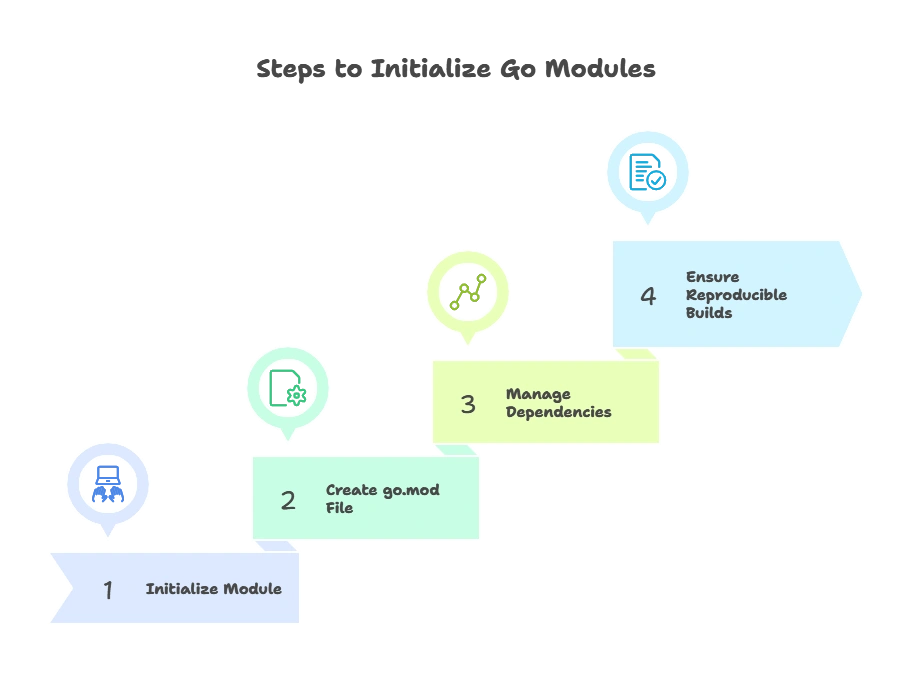Go Modules
Go modules have revolutionized dependency management in Go programming. They provide a standardized way to manage dependencies, ensuring versioning, reproducibility, and ease of use. This chapter delves deep into Go modules, covering everything from basic concepts to advanced techniques, empowering developers to harness the full potential of dependency management in Go.
Understanding Go Modules
Basic Concepts
Go modules are collections of Go packages versioned together. They allow developers to manage dependencies at the module level, ensuring consistent and reproducible builds. Modules are initialized using the go mod init command, which creates a go.mod file in the project directory.

Working with Dependencies
Dependency Declaration
Dependencies are declared in the go.mod file using the require directive. Each dependency specifies the module path and version constraints.
module example.com/myproject
require (
github.com/pkg/errors v0.9.1
github.com/gorilla/mux v1.8.0
)
Adding Dependencies
Dependencies can be added to a Go module using the go get command followed by the module path. This command fetches the specified module and updates the go.mod file.
go get github.com/gorilla/mux
Managing Dependencies
Updating Dependencies
To update dependencies to their latest versions, developers can use the go get -u command. This command fetches the latest versions of all dependencies and updates the go.mod file accordingly.
go get -u
Vendor Directory
The vendor directory contains copies of all dependencies used by the project. It allows developers to have full control over the project’s dependencies, ensuring reproducible builds and avoiding conflicts with other projects.
go mod vendor
Advanced Dependency Management
Dependency Exclusions
Go modules support excluding specific versions of dependencies using the exclude directive in the go.mod file. This can be useful for resolving conflicts or excluding incompatible versions.
module example.com/myproject
require (
github.com/pkg/errors v0.9.1
github.com/gorilla/mux v1.8.0
)
exclude (
github.com/pkg/errors v1.0.0 // Exclude version 1.0.0 of github.com/pkg/errors
)
Replacing Dependencies
Go modules allow developers to replace dependencies with alternative implementations using the replace directive in the go.mod file. This can be useful for using custom versions or modified versions of dependencies.
module example.com/myproject
require (
github.com/pkg/errors v0.9.1
)
replace github.com/pkg/errors => github.com/myorg/errors v1.0.0 // Replace github.com/pkg/errors with a custom version
Semantic Versioning
Understanding semantic versioning (SemVer) is crucial for managing dependencies effectively. SemVer specifies how version numbers should be incremented based on the type of changes in a module: major, minor, and patch versions. By adhering to SemVer principles, developers can ensure compatibility and minimize breaking changes in their projects.
v1.2.3
^1.2.3
~1.2.3
Dependency Locking
Dependency locking ensures that builds are reproducible by fixing the versions of all dependencies. Go modules automatically generate a go.sum file, which contains cryptographic hashes of module versions used in the project. This file guarantees that subsequent builds use the same versions of dependencies, preventing unexpected changes due to updates.
github.com/pkg/errors v0.9.1 h1:KtE1DiUk78HZgDx+0MnXZzdTHlRn5ZQT4nPEOZ8LmuY=
github.com/pkg/errors v0.9.1/go.mod h1:vUFA+vH2mWtOQpE1T++JTy4zT5ZnnZ/EWXY5DTh3f9I=
github.com/gorilla/mux v1.8.0 h1:LklXbwn9ro3yDQdV0+otMk3wAw7bG8yr2E7hBw4m2aA=
github.com/gorilla/mux v1.8.0/go.mod h1:HOtzYOZC7jY7FL7SCgYa9SRdXMHp2P1j7r7itMLfQJg=
Pseudo Versions
Pseudo versions are special version numbers generated by Go modules for commits that are not tagged with a semantic version. Pseudo versions allow developers to use untagged commits as dependencies, providing flexibility when working with experimental or unreleased code.
v0.0.0-20220101000000-abcdefabcdef
Private Modules
While Go modules primarily rely on public repositories like GitHub, developers can also create private modules hosted on private repositories or internal servers. By specifying the module path with authentication credentials, developers can access and use private modules seamlessly within their projects.
module example.com/myproject
require (
example.com/private/module v1.0.0
)
replace example.com/private/module => example.com/private/module v1.0.0 // Replace with private module
Go modules have transformed the landscape of dependency management in Go programming. By providing a standardized and efficient way to manage dependencies, Go modules enable developers to create reliable, maintainable, and scalable software solutions. Happy coding !❤️
